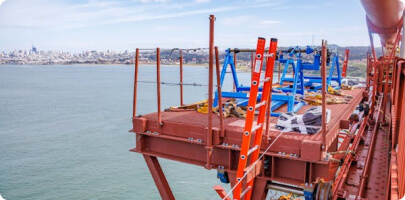Activities/Functions of the Upstream Department
- Co-ordination and Monitoring of Policies and Programmes and evaluation of projects in the Upstream Sector of the oil industry;
- Maintaining constant supervision over indices relevant to production capacity and advise Federal Government on appropriate strategies to meet Nigeria’s set Oil production targets;
- Establishing of guidelines and codes of conduct for all licensed exploration and production Companies, marginal filed operators and service providers in the upstream segment of the Oil subsector;
- Monitoring and evaluation of all approved seismic and logging operations in drilling platforms;
- Formulation of policy framework for the development of database on production field-by-field basis;
- Ensuring compliance with relevant guidelines on payment of royalties and petroleum profit taxes;
- Developing policy standards and procedures for facilities design, engineering, construction and operations in the Upstream segment of the Oil industry;
- Evaluation of facilities design proposals to ascertain design, preliminary plot plan, process flow diagrams and hazards analysis statements;
- Ensuring compliance on correct application of certified codes and standards for conceptual studies and basic engineering designs;
- Analysis on exploration and production activities and their base effects on the other sectors of the economy;
- Develop adequate reports on and interface with the National Assembly on Upstream matters;
- Ensuring equitable and transparent access to exploration network;
- Collaboration with the Human Resources Department on identifying skills gap and appropriate training for staff of the Department for optimal performance;
- Participation in bilateral and multilateral meetings/engagements concerning the Department in the Petroleum industry;
- Participate in award and termination process for Licenses, leases and contract in the Oil industry;
- Reform and general administrative activities in the Department;
- Budget preparation for effective planning of the activities of the Department;
- Encouraging private sector participation and diversification of products sourcing through introduction of price modulation mechanism and appropriate pricing frameworks to discourage profiteering and eliminate petroleum subsidy;
- Collaboration with NCDMB on the enforcement of Local Content to ensure compliance with guidelines;
- Engagement with consultants and relevant MDA’s for policy on pipeline security vigilance and Network codes;
- Collaboration with Federal Ministry of Environment on Oil spills and detection regulation and enforcement standards in the Oil industry;
- Analysis and investment options through divestment of Oil facilities to competent and qualified private sector operators;
- Process Complaints and Petitions from aggrieved stakeholders and investors for effective service delivery in the Oil industry;
- Inventories of Oil facilities in the country with a view to establishing a database;
- Engagement with critical stakeholders on business development and investment in the upstream sector of the oil industry;
- Engagement with the stakeholders and industrial Unions for peace and uninterrupted flow of activities in the Oil sector;
- Participating in the IEF, OPEC and APPO matters;
- Ensuring synergy in the operations of the Ministry’s Agencies through coordinative tactics;
- Other issues as may be directed by the Honorable Minister and Permanent Secretary.

